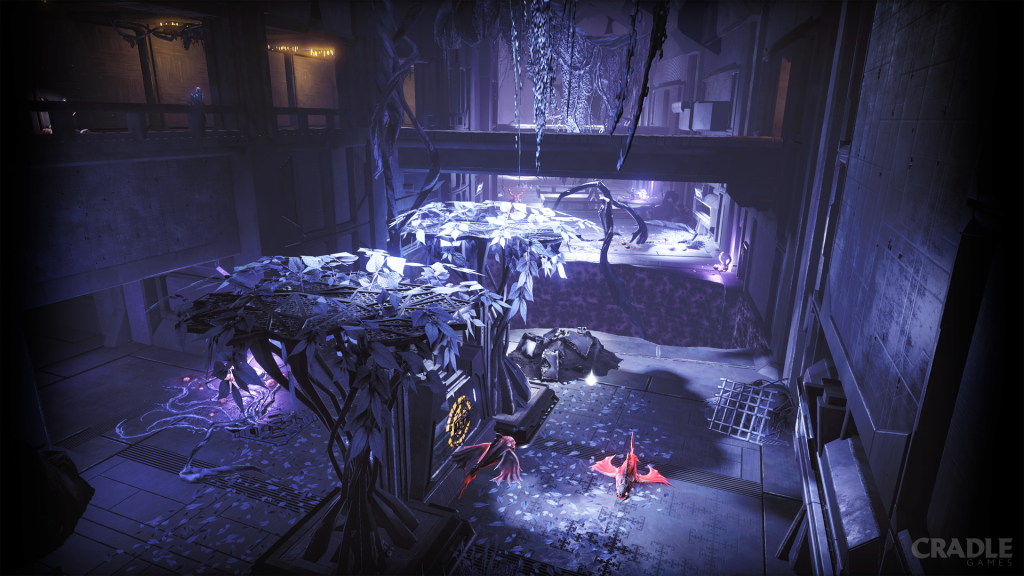Hellpoint is an unholy marriage between Dark Souls and Dead Space, plunging players into a titanic, demon-infested space station. Punishing combat, astonishing visuals – the Souslike genre is going to space, and it’s doing so in style.
Visually and atmospherically, Hellpoint is damn near perfect. Even on Switch, the Irid Novo feels massive and alive, switching from cramped, crimson-soaked corridors to star-dotted vistas. The story is never spelled out for you, encouraging the player to fill in the gaps via found transmissions and implication – this is something that a lot of Soulslikes implement, and it’s done very well in Hellpoint. You play as the Spawn, a mechanical clone without a soul, and all you know is that basically everything wants to kill you.
“It’s clear Hellpoint has been a complete labour of love.”
The world is something special. There’s bits of Bloodborne, Dead Space and DOOM, all woven together beautifully to create an engrossing universe. From an artistic standpoint it’s clear Hellpoint has been a complete labour of love for Cradle Games. Blending sci-fi and the occult together is hardly a new concept but it can be hard to pull it off in a way that doesn’t feel derivative, and they’ve definitely achieved that here. Hellpoint is very much its own world, and though it’s built on the genre-creating foundations FromSoftware laid, it dares to do something new.

Where Hellpoint fails to impress as much is in the elements it lifts from Dark Souls. Melee combat is simply too janky and sluggish to feel satisfying, and even as the game’s moody sci-fi atmosphere intoxicates you, the core gameplay just feels rough a lot of the time. It lacks a lot of the precision that makes Dark Souls punishing yet fair, and a very wobbly difficulty curve means the late game isn’t anywhere near as challenging as the beginning. All the usual suspects are here with a few tweaks for variety’s sake – bonfires have been replaced with breaches, which don’t respawn enemies and refill your health on use.
“Though the world is incredibly well-made and rich in atmosphere, that appeal only lasts so long.”
It’s a small change that makes a big difference. Enemies come back based on varying respawn timers, so when you have to backtrack – and you will have to backtrack – it doesn’t mean fighting the same old enemies over and over again. Your health booster is refilled by attacking enemies, encouraging aggression in a similar way to Bloodborne. Unfortunately Hellpoint has none of Bloodborne‘s grace or fluidity, so that often means clunkily wading back into combat and hoping for the best rather than weaving in and out of fights to manage your health. Though the world is incredibly well-made and rich in atmosphere, that appeal only lasts so long when the gameplay itself is so stilted. It’s like going to a Michelin star restaurant and getting McDonald’s.

It wouldn’t be a Soulslike without David vs Goliath bouts against gigantic opponents, and they’re here in absolute force. The bosses vary wildly in difficulty, following not so much a learning curve as a learning scribble of sorts. Later on, many of the enemies you face are simply smaller models of these big boss creatures as Hellpoint desperately recycles content to bulk itself out. If this was made by a bigger studio, I’d be roasting them over the fire right now – but this is an incredibly ambitious project for a small studio, and as such a few cut corners are disappointing yet forgivable.
The strangest thing is, despite my low opinion of the game’s combat, I’d still recommend Hellpoint to Soulslike lovers – getting through the gameplay’s rough edges can feel like a bit of a chore, but the world it all takes place in is genuinely interesting enough to sell it. Loving it might take a bit of work, but if you love the setting, it’s brought to life in remarkable detail.
As mentioned before, we reviewed it on Switch, and while it’s impressive to have a game like this on the go, I think Nintendo’s hybrid handheld is not the best home for it. I’d be very keen to see how it runs on PC, as it’s likely a much smoother experience all round.

Hellpoint – Not doomed yet
Hellpoint is an incredible world and an average game. It makes a few interesting tweaks to the Soulslike formula, but the core combat just doesn’t feel responsive or interesting enough to keep it exciting death after death. It occupies an awkward space in my brain – I’m scoring it around the halfway mark, and yet I still feel as though some people will get a hell of a lot of enjoyment out of it. It’s entirely possible that a lot of my gripes with the combat and performance were down to playing on Switch, so maybe give that version a miss if you can.
Hellpoint was developed by Cradle Games, published by TinyBuild, and is available on PC, Xbox, PlayStation and Switch. Check out more of our game reviews here!